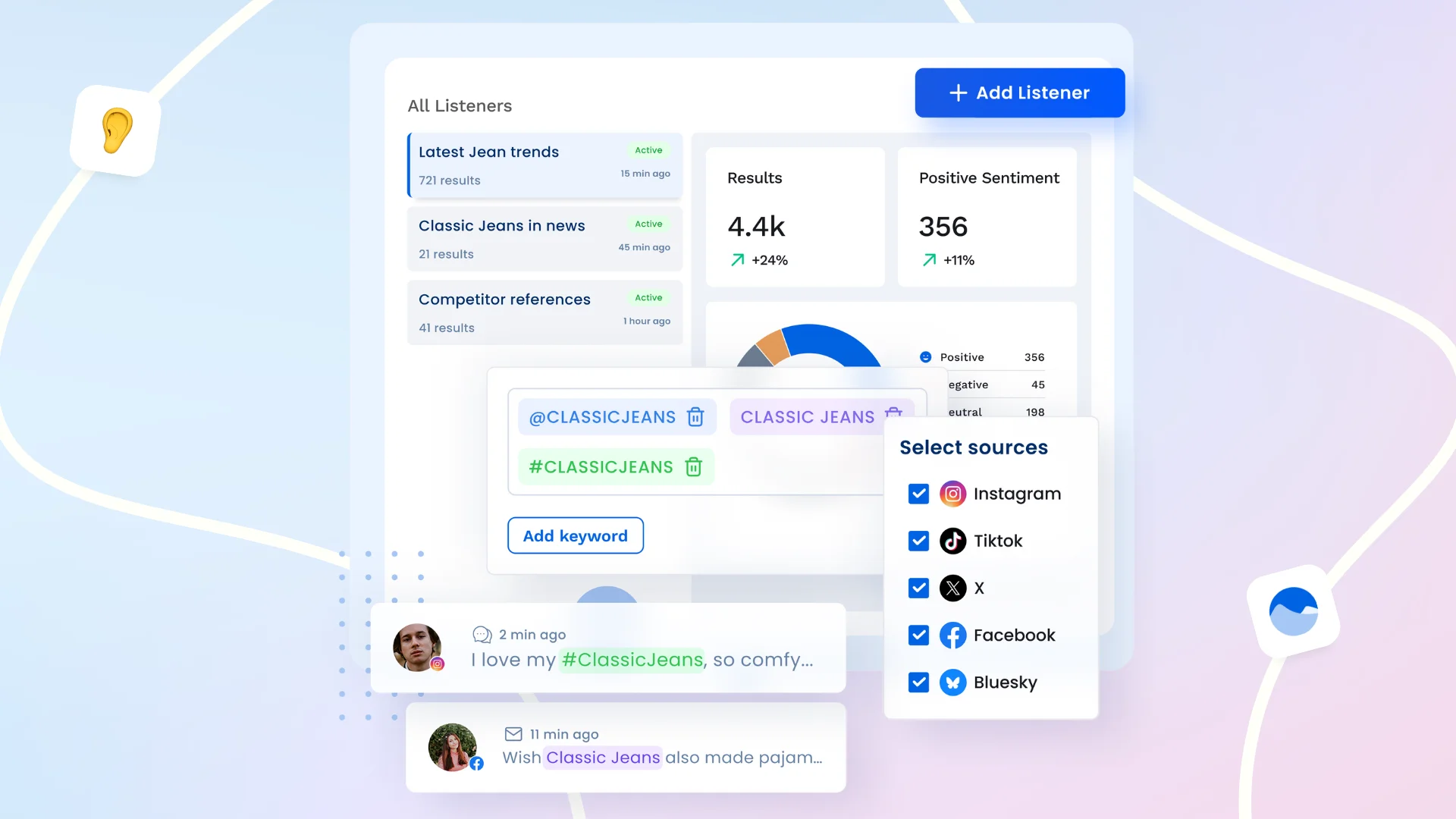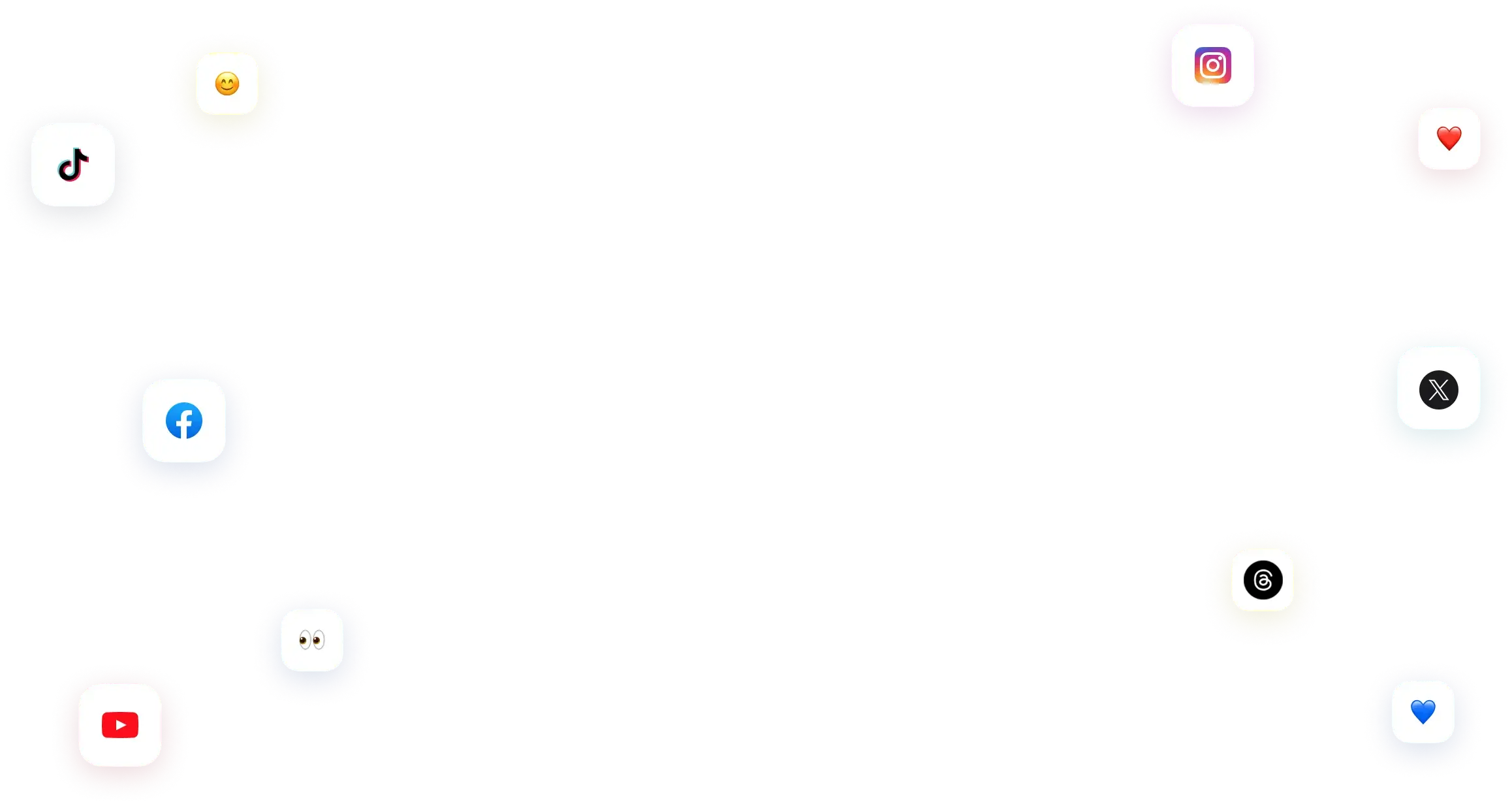New

Social Listening Made Simple: How to Use It for Brand Growth
Learn why social listening is no longer just for big brands and how Vista Social makes it affordable for creators, agencies, and small businesses.

How Something Social Saved 75% of Their Time and Increased Revenue by 15%
See how a fast-growing agency improved operations, cut down hours of manual work, and unlocked new revenue opportunities with Vista Social.
New

50 Unique Social Media Ideas for Consistent Content Creation
Discover 50 unique social media post ideas to engage your audience, grow your brand, and maintain a consistent content strategy with ease!
Social Media Algorithm Guide for Agencies [2025]
Updated on January 28, 2025
12 min to read
Content Writer
Published September 20, 2024
![Social Media Algorithm Guide for Agencies [2025] Social Media Algorithm Guide for Agencies [2025]](https://dc4ifv9abstiv.cloudfront.net/blog/2024/09/social-media-algorithm.jpg?v=1752769846787)

Content
Share

Audiences, especially non-followers, often don’t engage with your clients’ content for the simple reason that they don’t see the posts.
One of the factors influencing this is the social media algorithm.
The algorithm decides which content to show on the users’ feeds based on relevance, engagement, and other factors.
While you can’t “control” the algorithm, you can implement strategies and create content influencing how it ranks and displays posts.
In this guide, we’ll explore the nuts and bolts of a social media algorithm and how it works, including tips, tricks, and tools to help you make it work for your clients.
Table of contents
What you will learn
- What is a social media algorithm?
- How does a social media algorithm work?
- How does each social media algorithm on each platform work?
- What are the top tips to score points with the social media algorithm?
- What are the social media algorithm FAQs?
- Ready to make the social media algorithm work for your clients?
What is a social media algorithm?
A social media algorithm is a set of signals and rules that automatically decide which content to show on a user’s feed.
The algorithm ranks social media posts based on how likely users will interact with and like them.
Essentially, social media algorithms ensure that users only see posts that will interest them at the top of their feeds, providing a good and personalized experience.
How does a social media algorithm work?
How social media algorithms work can vary for each platform.
However, all the algorithms are based on Machine Learning (ML) and a set of factors known as ranking signals.
The signals are used to rank each social media content’s value for each user at a specific time.
While the algorithms are based on highly advanced Artificial Intelligence (AI) processes, their goal is simple: index, score, and rank social media posts to determine what to show in a user’s feed.
Ranking signals in social media algorithms are individualized since they’re often based on each user’s interactions with content on the platform.
The algorithm aims to entice users to stay on the platform by showing them posts that keep them scrolling, watching, liking, and interacting.
[Must read: Social Media Interaction Post Ideas This 2022]
How does each social media algorithm on each platform work?
The truth is that social media platforms don’t reveal exactly how their algorithms work.
However, many platforms provide more information on their ranking signals and how their algorithms generally work.
The information can help you adjust your clients’ content and strategies to get on the good side of social media algorithms.
That said, below are the essential known ranking signals for various social media platforms.
The Facebook feed ranking signals include the following:
- Content type. The more content users consume, the more similar posts they get. For instance, Facebook users who watch more videos will get more videos shown on their feeds
- Facebook connections. Facebook feeds are mainly filled with content from Pages and people that users interact with and follow
- Relevance score. The relevance score predicts how meaningful a post is to users. The algorithm then ranks the posts based on the score (highest to lowest relevance)
- Likelihood of user engagement. The Facebook algorithm predicts the likelihood of users liking, sharing, or commenting on a post based on past activities
Instagram algorithms
Instagram uses multiple algorithms for its Feed, Stories, Reels, and Explore features.
Let’s go over each algorithm’s ranking signals.
Instagram Stories algorithm
The algorithm for Instagram Stories sorts and prioritizes content posted by accounts a user follows.
[Must read: Instagram Following List Order Algorithm Explained [2024]]
With the algorithm set up this way, your clients won’t get new eyeballs in their Stories.
However, you can still leverage how the algorithm works to help expand your clients’ organic reach.
The Instagram Story algorithm ranking signals include the following:
- Engagement history. The algorithm will likely show Stories to people who previously engaged with a user’s Stories
- Viewing history. Repeatedly watching a user’s Story will prompt the algorithm to show other Stories from that user on your Stories list. Stories you often skip will be moved to the back of the line
- Closeness. The algorithm will assess whether the user sharing the Story is your friend or family and will show the user’s Stories first on your list.
Instagram feed algorithm
Instagram’s feed algorithm prioritizes content based on the following ranking signals.
- User activity. The algorithm factors in the content a user shares, comments on, likes, shares, and saves when recommending or displaying Instagram feed posts
- Post information. The more popular the post, the more likely the algorithm will rank it first. The algorithm will also assess how quickly users interact with the content to rank it
- Poster information. The signal is used to assess how interested a user may be in the Instagram account that posted the content based on previous interactions
- User history with the poster. The algorithm will likely show content from the people the user follows, messages, or engages with
Instagram Reels algorithm
According to Instagram, its Reels algorithm focuses on entertaining and engaging content users want to watch to the end, like, and repost.
The IG Reels algorithm’s ranking signals include the following.
- User activity. Shares, likes, comments, saves….you know the drill
- User history with the poster. The algorithm considers the user’s previous interactions with the poster when “deciding” which content to show and display first
- Reel information. This ranking signal factors in visual and audio track details, including the speed and level of engagement with the Reel
- Poster information. The algorithm will consider the poster’s number of followers and level of engagement when ranking reels
Instagram Explore algorithm
Instagram’s Explore algorithm is designed to show users the types of content they’re likely to engage with, such as saving, liking, and sharing.
The Explore Page algorithm’s ranking signals include:
- User activity in Explore. The ranking signal is similar to the Feed algorithm’s, but this one focuses more on the content type
- Post information. The Explore Page algorithm looks at the speed and level of interaction the user has with a post when determining which content to feature first
- Poster information. Similar to the Feed algorithm, the Explore algorithm looks for content from accounts with more followers and engagement
Threads algorithm
While Threads is relatively new to the game, it still uses an algorithm to personalize and recommend content to users.
The platform’s known ranking signals include:
- User interactions. This refers to the number of times a user has liked the poster’s posts (thread) and how often the user viewed the poster’s profile on Instagram
- Popularity. This is the number of times people have viewed or responded to a specific post (thread) and the number of times people have clicked on the account’s profile
TikTok algorithm
TikTok’s algorithm is a bit unique since it is designed to show new content instead of content from creators that users already follow.
The TikTok algorithm’s known ranking signals include the following:
- User behavior on Discover. This ranking signal analyzes the content’s characteristics, such as sounds, trending topics, effects, and captions
- Previous interactions. The algorithm considers signals such as accounts the users have followed and hidden, including the content the user marked as not interesting or engaged with
- Trends. TikTok’s algorithm tends to favor content that includes trending effects and sounds
- Location and language. The algorithm often prioritizes content from the user’s country or language
Contrary to popular belief, TikTok’s algorithm doesn’t consider follower count a ranking signal.
[Must read: TikTok Algorithm 2024 Explained: How It Works + Tips to Go Viral]
One way to determine whether TikTok’s algorithm favors your client’s content is to check the percentage of users who saw the videos on the For You Pages (FYPS).
A high number can mean that the algorithm is placing your clients’ videos in other users’ home feeds, drawing more eyeballs to the posts.
LinkedIn algorithm
LinkedIn’s algorithm isn’t designed to make any content go viral.
The best way to get your clients noticed by the algorithm and other users is to create high-quality content tailored to your target audiences’ needs, interests, and preferences.
The LinkedIn algorithm’s known ranking signals include the following:
- Content. LinkedIn ranks content based on factors such as what and who is mentioned in the post, how meaningful the comments section discussion is, and the post’s popularity
- Identity. The algorithm considers how closely a user is related to a follower or someone in their extended network, including the user’s profile location
- Member activity. The algorithm looks at the hashtags, groups, people, and pages followed, including a user’s interactions with posts about similar topics to rank content
YouTube algorithm
Like TikTok, YouTube’s algorithm focuses more on showing users new content than videos from subscribed channels.
The platform’s known ranking signals are:
- User activity. YouTube’s algorithm suggests new videos based on the user’s previously watched content
- Channel and topic watch duration. YouTube will show more content from channels that users frequently watch content from
- Videos that are often watched together. YouTube’s algorithm factors in other user behaviors, such as other videos the user watches, to identify content they potentially like and will watch
- Video performance. YouTube’s algorithm looks at the average view duration, likes and dislikes, and post-watch survey feedback
- Trending songs and audio samples (YouTube Shorts). The YouTube Shorts algorithm considers trending audio and sounds used in Shorts videos to understand the trends and content that users may be interested in
[Must read: How the YouTube Shorts Algorithm Works [2024]: w/ Tips & FAQs]
X (Twitter) algorithm
The X (Previously Twitter) algorithm’s For You page ranking signals include the following:
- Content quality. X’s algorithm ranks and recommends content based on its relevance, credibility, and whether it is safe for all users
- User connections. The algorithm can recommend content based on the topics and accounts the user already follows
- Popularity. X’s algorithm ranks content based on how people in the user’s network interact with a post
Pinterest algorithm
Pinterest’s algorithm focuses more on search, which is slightly different from most social media platform algorithms.
Essentially, the platform’s algorithm ranks content based on relevance and quality over frequency.
Pinterest’s known ranking signals include the following.
- Metadata. The metadata applies to brands on Pinterest with product catalogs (not Pins). The platform’s algorithm looks at this metadata to recommend content to users
- Active engagement. Pinterest’s algorithm looks for high signals of meaningful engagement, which often translates to saves
What are the top tips to score points with the social media algorithm?
Winning the favor of social media algorithms takes the right strategies.
Below are several best practices to help your clients get on the good side of social media algorithms.
1. Get to know social SEO
Wait a minute.
Try Vista Social for Free
A social media management platform that actually helps you grow with easy-to-use content planning, scheduling, engagement and analytics tools.
Get Started NowWhat do social media algorithms have to do with social Search Engine Optimization (SEO)?
A lot, actually, since social SEO helps boost the discoverability and visibility of your clients’ content, making them noticeable to algorithms.
For instance, SEO practices such as adding relevant keywords in your clients’ post descriptions, profiles, hashtags, and more help algorithms determine the content’s relevance, which is a key ranking signal.
Use Vista Social to find relevant and popular hashtags in your industry, niche, or among your clients’ audiences.
The social media management platform has an AI-powered hashtag generator that simplifies hashtag research and discovery.

2. Understand your target audience
What audiences deem relevant content can depend on their demographics, interests, pain points, and needs.
That is why it’s crucial to understand your clients’ target audiences to tailor social media content that addresses their specific needs.
Relevant content that resonates with your clients’ followers can get the algorithm’s attention.
It increases the chances of the algorithm putting your client’s content first in their audiences’ feeds.
3. Identify optimal posting times
Many social media algorithms consider early engagement and recent interactions critical ranking signals.
That said, knowing when your clients’ target audiences will most likely be active and ready to engage on each social media platform is crucial.
Finding optimal posting times is easy with Vista Social’s social media publishing feature.
After creating and customizing your client’s post in the Publisher, you can set your preferred auto-posting schedule or choose from the platform’s suggested optimal publishing times.

The platform analyzes your clients’ audience engagement patterns, content velocity, and other key factors to determine the most active times to ensure authentic and maximum engagement.
4. Encourage interactions and engagement
Engagement is a crucial social media algorithm ranking signal, especially early engagement.
An easy yet effective way to generate more engagement is to ask for it.
No, I don’t mean begging followers to share or like your clients’ posts. Instead, create content that people can’t help but engage with.
For instance, you can host Instagram giveaways, Facebook polls, TikTok challenges, and more to encourage engagement, especially shares.
Another excellent engagement-boosting tactic is to engage with your clients’ followers.
Jump into the comments section and answer questions or start conversations to jumpstart discussions, which can lead to more engagement.
Simplify tracking, managing, and responding to all your clients’ social interactions with Vista Social’s social media engagement feature.
It includes a smart and unified Social Inbox that lets you view and respond to all your clients’ messages, comments, mentions, and reviews from one place.

This way, you won’t miss any engagement opportunities and respond to inquiries promptly. It helps your clients provide seamless user experiences to followers and customers.
Use the AI Assistant to generate relevant and engaging replies quickly.
You can also use the AI Assistant in Vista Social’s Publisher to generate and refine post descriptions and taglines to make your clients’ posts more engaging.
Remember, social media algorithms favor content and accounts with high engagement rates, so engage your clients’ audiences wherever and however you can.
5. Experiment and get creative
The reality is that making social media algorithms work for your clients is a science and an art.
Plus, social media platforms constantly update their algorithms, so what may work for your clients now may not work as well in the future.
Your best bet is to stay on top of social media algorithm ranking signals, trends, and changes and adjust your clients’ content and strategies accordingly.
Also, experiment with your clients’ posts and tactics to see what works best for their audiences and the algorithms.
Key metrics such as engagement, impressions, reach, etc. can give you a good idea of what content types and formats resonate best with your clients’ audiences.
Leverage Vista Social’s social media analytics feature to track, measure, analyze, and gain insights into your clients’ content performance.

The platform also lets you create custom reports and set schedules to auto-generate and share the reports with clients and other stakeholders.
[Must read: How to Create Automated Social Media Reports]

Mix and match your clients’ content, formats, visuals, captions, and more to create content that engages audiences and catches the algorithm’s attention.
6. Share more videos
Many social media algorithms embrace videos, especially short-form videos since these tend to get the highest engagement rates.
Think of viral TikTok videos.
To capture the attention of social media algorithms, create more videos that align with your clients’ social media strategies and the platforms on which they are published.
You can help boost your clients’ engagement by creating and sharing more TikTok videos, Instagram Reels, YouTube Shorts, Facebook feed videos, etc.
However, don’t neglect other visual social media content, especially if they win over crowds.
Include other visually compelling content such as carousels, animations, slideshows, GIFs, infographics, and others.
7. Jump into trends
Trending posts and topics keep users engaged and scrolling for more, making them the go-to content for social media algorithms to feature.
Help your clients join the fun by creating content incorporating trending topics or activities into their social media posts.
It can be anything, from a fun TikTok dance challenge to popular sounds or audio clips.
However, avoid jumping into every trend you see in the name of popularity.
Be selective and consider only weaving in trends that align with your clients’ brands, including their tone, style, messaging, current campaigns, and social media guidelines.
[Must read: Social Media Guidelines: How to Create One for Your Team]
The best place to start is to listen to what your clients’ followers are saying on social media through social listening.
Use Vista Social’s social media listening feature to set up Listeners.
The Listeners can track and pull conversations around your specified keywords or topics across your clients’ connected profiles.

Social listening helps you understand what’s buzzing, including audience sentiment. This allows you to find trends to incorporate into your clients’ content strategies and score points with the algorithms.
[Must read: Social Media Sentiment Analysis: A Comprehensive Guide]
What are the social media algorithm FAQs?
Check out the commonly asked questions about social media algorithms below.
Which platforms have the best social media algorithms?
YouTube, Instagram, and Facebook are considered to have the strongest social media algorithms.
The platforms leverage advanced algorithms to surface and personalize relevant content for users.
The platforms also use their algorithms to stop the spread of hate speech and misinformation.
What is one disadvantage of social media algorithms?
One downside to social media algorithms is their tendency to be biased, such as featuring specific types of content over others or highlighting one voice while silencing others.
It can perpetuate the existing biases and inequalities within certain societies, potentially influencing social media users’ thinking, attitudes, and behaviors online and in real life.
How do social media algorithms impact businesses?
Social media algorithms can shape your client’s marketing strategies.
The algorithms essentially dictate what social media users see on their feeds, which significantly impacts how your clients’ brands engage audiences, the visibility of their content, and the effectiveness of their social media marketing efforts.
[Must read: Outsourcing Social Media Marketing: A Guide for Agencies]
Ready to make the social media algorithm work for your clients?
There is no one-size-fits-all formula to winning over social media algorithms.
However, you can boost the chances of the algorithms favoring your clients’ content by understanding how they work and knowing the effective strategies to make the algorithms work for them.
Use the right social media management tool to help put your clients in good standing with social media algorithms.
About the Author
Content Writer
Jimmy Rodela is a social media and content marketing consultant with over 9 years of experience, with work appearing on sites such as Business.com, Yahoo, SEMRush, and SearchEnginePeople. He specializes in social media, content marketing, SaaS, small business strategy, marketing automation, and content development.
Never Miss a Trend
Our newsletter is packed with the hottest posts and latest news in social media.

You have many things to do.
Let us help you with social media.
Use our free plan to build momentum for your social media presence.
Or skip ahead and try our paid plan to scale your social media efforts.
P.S. It will be a piece of cake 🍰 with Vista Social
Subscribe to our Newsletter!
to stay updated on the latest and greatest Social Media news
We promise not to spam you!


